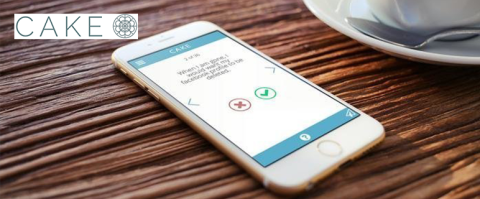
Planning for the end of your life is probably not high on your list of things to do right now. In fact, you probably don’t want to think about it at all. The idea of death makes us naturally squeamish and uncomfortable, so we put off even thinking about it. This is where Cake comes in. The Boston-based digital health startup aims to make planning for the end of your life as easy as, well, you know.
Cake makes the uncomfortable comfortable by organizing everything from your finances to your funeral arrangements in an easy to manage online platform. Born out of a meeting between Suelin Chen and Mark Zhang at an MIT Hackathon, Cake has grown to employ eight people and established a headquarters across from Boston’s South Station. They’ve also become part of the employee benefit packages at companies large and small.
In this piece we talk with Cake’s co-founders, but also with one of their customers, Blue Cross Blue Shield’s Senior Director of Health Policy and Strategic Research Anna Gosline.
What problem is Cake trying to solve?
Mark Zhang: The problem we’re trying to solve is that people don’t make end of life plans. When they do it’s fairly fragmented . You go to an estate attorney to do one thing, you go to a doctor to do another, but there’s no central storage area where you can record all this stuff and share it with people who matter. What we’re trying to do is two fold: lower the barrier so if you want to do advance care planning it is easy as possible; and make a central place for all this. The vision we have is for Cake to be synonymous with end of life planning in all aspects.
Suelin Chen: As challenging a topic as this is for a lot of us, it’s still a very positive act to do the planning, it’s actually a gift to your loved ones. Planning ahead makes things easier for your loved ones.
Who ultimately pays for this service and how does this reduce costs?
Chen: Cake is offered primarily through providers and payers but there are premium individual offerings available to consumers. Now, it should be no surprise that if you don’t plan for your death, you and your loved ones could pay a significant emotional and physical cost on top of the financial cost. A quarter of your lifetime health care expenditure is in the last year of your life. The only way to avoid receiving care you don’t want is through advanced planning. Because of the defaults built in our health care system, clinicians are required to do whatever they can to keep you alive unless you opt out.
Why did Blue Cross/Blue Shield decide to offer Cake?
Anna Gosline: We started working with Cake in 2017. We have a very robust advance planning program for our associates that started off with just lunch and learns. As part of that, we launched an internal survey to understand their concerns and questions about advance planning so we could better learn how to serve our associates. What really resonated with us is that our younger associates did not feel like it was relevant to them. This is where Cake comes in. It makes it really easy for people to address advance planning. Cake lowers the activation energy for people to engage in something that feels really abstract to a lot of the population.
What impressed you about Cake?
Gosline: It’s a scalable solution. It has education and completion of the important steps in one seamless user experience. It was designed by a younger generation with that younger generation’s thoughts in mind and it serves as a nice complement to what we’re doing with our own onsite materials. Cake has been really thinking through the consumer and provider experience from soup-to-nuts. They really think about where the opportunities are and they connect those dots.
Why did Cake decide to set up shop in Massachusetts?
Chen: Massachusetts has a really unique ecosystem for digital health given all the teaching hospitals, universities, and high-level technical talent here. The startup community here is really excellent. I think we’re a really mission driven company and when you look at startups in the Boston area, people are driven by a love for solving a hard technical problem or they’re on a mission. I don’t think the people here want to work on some dumb app or something that won’t have an impact. People here want substance.
Zhang: For me, when I was thinking about fellowships, the choices were Boston or San Francisco. It came down to the quality of clinical training here. It’s unparalleled. There’s some amazing programs here. There are few places where you can hit the ground running and you just can’t beat the level of training here. There’s just so many smart people here. Plus, the closeness of everything is great.
What were some of the challenges you faced with getting Cake off the ground?
Chen: I think one of the challenges we face is that everyone has a personal experience going into this. That’s a positive and a negative. Whether they’re a buyer or an investor, everyone maps it to themselves. I think that was a challenge because there’s always going to be people resistant to thinking about death, people who just viscerally can’t think about death.
Zhang: I think one thing that’s exciting about what we’re doing, but also a challenge is, we’re creating a product category that does not exist right now. It exists in other analogous sectors but not for this. Most people, when they think about end of life planning, they think of a will but now there's so much more. The vast majority of people, even extremely educated people, don’t know what all the components are that make up advance planning.
